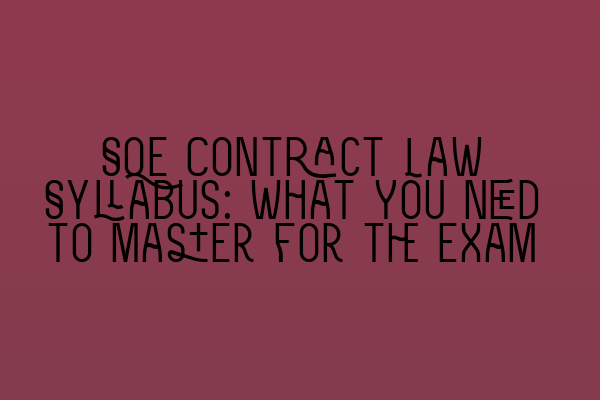SQE Contract Law Syllabus: What You Need to Master for the Exam
Are you preparing for the SQE Contract Law exam and feeling overwhelmed by the sheer volume of information you need to study? Don’t worry, we’ve got you covered! In this blog post, we will break down the SQE Contract Law syllabus for you and provide some tips on how to effectively study and prepare for the exam. Let’s dive right in!
1. Introduction to Contract Law
The first and foremost topic you need to master is the introduction to contract law. This includes understanding the fundamental principles of contract formation, offer and acceptance, consideration, and intention to create legal relations. Familiarize yourself with the elements of a valid contract and the various types of contracts such as bilateral, unilateral, and simple contracts.
2. Contract Terms and Interpretation
Next, focus on contract terms and their interpretation. Learn about express and implied terms, conditions, warranties, and innominate terms. Dive deep into the rules of contract interpretation, including the officious bystander test, the contra proferentem rule, and the parol evidence rule.
3. Contract Remedies
Understanding contract remedies is crucial for the SQE Contract Law exam. Study the different types of remedies available in contract law, such as damages, equitable remedies (injunctions, specific performance), and restitution. Familiarize yourself with the principles governing the measurement of damages, including the expectation, reliance, and restitution measures.
4. Vitiating Factors
Vitiating factors can render a contract void or voidable. Thoroughly study the vitiating factors such as mistake, misrepresentation, duress, undue influence, and illegality. Learn how these factors can impact the validity of a contract and the remedies available in each case.
5. Discharge of Contract
Contracts can be discharged in various ways. Explore the grounds for discharge, including performance, agreement, frustration, and breach. Understand the consequences of discharge, such as the discharge of future obligations and the availability of remedies for breach of contract.
6. Agency
Contract law often involves the concept of agency, where one party (the agent) acts on behalf of another party (the principal). Study the principles of agency, including the creation of agency relationships, the authority of agents, and the liability of principals for the actions of their agents.
7. Third-Party Rights
Be familiar with the rules surrounding third-party rights in contracts. Understand the differences between the common law and statutory rules governing third-party rights and the circumstances in which a third party can enforce a contract.
8. Consumer Contracts
Consumer contracts are subject to specific regulations and protections. Study the rights and remedies available to consumers under consumer protection legislation, including unfair terms and consumer guarantees.
9. International Contracts
International contracts involve additional complexities. Learn about the key principles of international contract law, including jurisdiction, choice of law, and the application of international conventions such as the United Nations Convention on Contracts for the International Sale of Goods (CISG).
10. Practical Skills
Finally, the SQE Contract Law exam also assesses your practical skills. Practice drafting contracts, identifying and advising on contractual issues, and analyzing contract-related scenarios. Pay attention to legal writing conventions and use case law and legal principles to support your analysis.
Conclusion
Mastering the SQE Contract Law syllabus requires a comprehensive understanding of the fundamental principles, key concepts, and practical skills associated with contract law. Break down your study sessions into manageable parts, dedicate ample time to each topic, and utilize practice questions and mock exams to assess your progress.
Remember, effective preparation is the key to success in the SQE Contract Law exam. With a systematic study plan and a thorough understanding of the syllabus, you can confidently tackle the exam and achieve your desired results.
Good luck with your studies and future legal career!
Keywords: SQE Contract Law, SQE Contract Law exam, SQE Contract Law syllabus, contract law, offer and acceptance, consideration, intention to create legal relations, contract terms, contract interpretation, express terms, implied terms, conditions, warranties, officious bystander test, contra proferentem rule, parol evidence rule, contract remedies, damages, equitable remedies, restitution, vitiating factors, mistake, misrepresentation, duress, undue influence, illegality, discharge of contract, performance, agreement, frustration, breach, agency, third-party rights, consumer contracts, international contracts, practical skills, legal writing, case law, mock exams.
